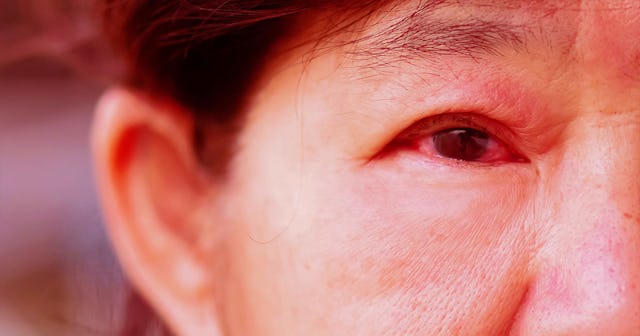Ocular Rosacea Is A Real Thing, And It Sucks

I’m writing this piece today, because I’m having a decent “eye day,” and I can stand to look at a computer screen for more than a few minutes. I have learned to ride these good waves with productivity and joy, and ride out the bad waves with self-compassion, ice packs, and a good podcast.
My struggle with ocular rosacea began 18 months ago, when I first noticed some discomfort with my contact lenses. I had been wearing contacts for twenty years, but suddenly I had to reduce my wear time, until I couldn’t stand to put them in my eyes at all.
My optometrist initially diagnosed me with dry eye, but it wasn’t until six months later, at a dry eye clinic in Toronto, that I received my official diagnosis: ocular rosacea and meibomian gland dysfunction. The tiny vessels in my lid margins indicated rosacea, and they had caused my glands to stop producing the oily layer of tears. Without the critical top layer of my tear film, my tears were evaporating almost instantly.
My dry eye symptoms are extremely bothersome, but my rosacea flare-ups that come and go really knock me out of commission. During a flare, I experience photophobia (light sensitivity), and my inner eyelids feel like they’re made of sandpaper. It hurts to blink, or look at my phone. Driving is out of the question during these times. Some sufferers experience extreme redness, but my eyes look completely normal.
I have tried many of the available treatments for ocular rosacea, but it is unfortunately a chronic condition. Common first line treatments include oral antibiotics (didn’t help me), topical steroids (these caused me extreme rebound inflammation), or prescription anti-inflammatory eye drops such as Restasis and Xiidra. I have been on Restasis for seven months, and I believe it has improved my symptoms by about 10-15%.
I have also tried various in-office treatments, some involving Intense Pulsed Light. These treatments usually flare me up initially, but ultimately, I think they have helped me marginally. I’ve also tried elimination diets, dietary supplements, hot compresses, and lid hygiene. I’ve tried the majority of the treatments that are available in Canada, most of which are not covered by insurance. I am thousands of dollars in, without drastic results. But I refuse to give up hope. One day I will find the right combination of treatments that will allow me to function more fully again. I may always have flares, but as my finance-industry husband likes to remind me “higher highs and higher lows are the goal” (it’s a stock market reference, but applies well to my situation).
Dimitri Otis/Getty
The condition has definitely taken a toll on my mental health. During a flare, I tend to panic and worry that my eyes will feel this awful forever. Between flares, I feel so grateful to be able to function, but I also feel waves of resentment. Why is this happening to me? Will I ever be able to wear contacts and makeup again? It sounds superficial, but I’ve spent the last decade building a career as a singer/songwriter. Not wearing makeup on stage, or during promotional engagements is kind of a problem.
Will my condition be stable enough that I can even make professional commitments again? Of course I’m grateful that my condition is not life-threatening. I know that many people have it so much worse. But sometimes I need to give myself permission to acknowledge how painful this experience has been, both mentally and physically.
Like many sufferers of chronic conditions, I have been on a quest to understand why on earth this is happening to me. Medical doctors haven’t offered much in the way of root cause theories, aside from the fact that many people get rosacea in their thirties, and I just happen to experience my symptoms in my eyes.
I am a mom to two boys, aged three and five. I am so fortunate to have a partner with a stable job, who has shown me endless support and love through this challenging time. We have enough help with the kids to fill the gaps when I am stuck in bed with ice on my face. We have been able to afford my treatments. We are the lucky ones.
If your eyes feel uncomfortable, or you are experiencing symptoms of dry eye, do not minimize it. See your eye care professional. If not addressed, those precious meibomian glands can atrophy and be gone for good. If you have healthy, juicy eyes, take care of them! Wash your face, remove your makeup, don’t sleep in your contacts, and clean your damn brushes (I say this with love)!
If you are suffering from this condition, or any other chronic invisible condition, I see you. I feel your pain. I hope you are learning, as I am, to ride the waves, take a deep breath, love yourself and hold onto hope for a better tomorrow.
This article was originally published on